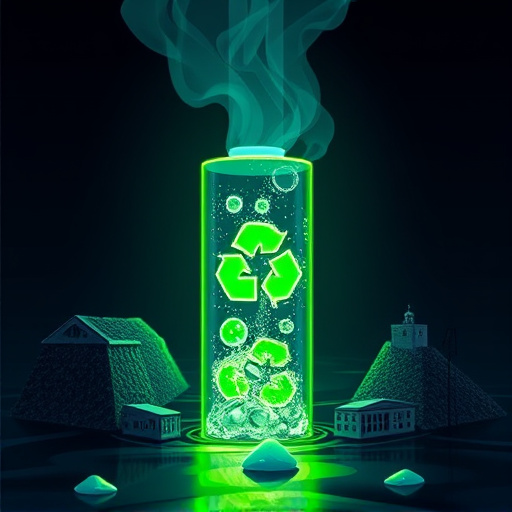Lithium mining for batteries, critical for modern tech and EVs, poses severe environmental challenges like soil and water pollution in arid regions. To mitigate these issues, prioritizing battery recycling is essential for reducing raw material extraction, lowering carbon footprints, and addressing e-waste. Additionally, adopting sustainable batteries and strict waste management regulations throughout the battery lifecycle are crucial to minimize lithium pollution, soil contamination, and water usage. Effective strategies are needed to balance the growing demand for lithium with its environmental impact.
The global push for electric vehicles and renewable energy has fueled a surge in demand for lithium, driving mining operations worldwide. However, the environmental impact of lithium mining for battery production is significant, contributing to water and soil contamination, habitat disruption, and greenhouse gas emissions. This article explores critical aspects of lithium mining impact, delves into promising solutions like battery recycling, and highlights strategies to mitigate pollution and reduce the carbon footprint of e-waste throughout the battery lifecycle.
- Lithium Mining Impact: Unraveling the Environmental Concerns
- Battery Recycling: A Sustainable Solution to Minimize Pollution
- Addressing Lithium Pollution and Soil Contamination
- Moving Towards Sustainable Batteries: Reducing Carbon Footprint in E-waste Management
Lithium Mining Impact: Unraveling the Environmental Concerns

Lithium mining for battery production has gained significant attention due to its pivotal role in powering modern technology and electric vehicles. However, the lithium mining impact on the environment cannot be overlooked. The process involves extensive extraction and processing, leading to various environmental concerns. One of the primary issues is soil and water contamination. Lithium mining often occurs in arid regions, where water sources are already scarce. The extraction processes can result in the release of toxic chemicals into nearby rivers, lakes, and groundwater, causing severe pollution.
Additionally, battery recycling plays a crucial role in mitigating the environmental impact. As e-waste continues to grow with the rapid advancement of technology, the recycling of lithium-ion batteries becomes increasingly important. Effective battery recycling can reduce the need for fresh lithium extraction, thereby minimizing soil contamination and water pollution associated with mining. Moreover, focusing on sustainable batteries and optimizing the battery lifecycle is essential. This includes reducing the carbon footprint of production processes, ensuring proper disposal methods, and encouraging a circular economy approach to alleviate the overall environmental impact of lithium mining.
Battery Recycling: A Sustainable Solution to Minimize Pollution

Battery recycling offers a promising solution to mitigate the environmental impact of lithium mining for battery production. As the demand for sustainable energy storage solutions grows, so does the need for responsible disposal and recycling practices. Recycling lithium-ion batteries can significantly reduce the extraction of raw materials from the earth, thereby minimizing the associated lithium mining impact. By recovering valuable metals like cobalt, nickel, and lithium from used batteries, we can decrease soil contamination and water pollution linked to traditional mining processes.
Furthermore, battery recycling contributes to a circular economy by lowering the carbon footprint of the entire battery lifecycle. The process involves sorting, disassembling, and refining materials, which reduces energy consumption and greenhouse gas emissions compared to producing new batteries from scratch. Moreover, it helps address the growing issue of e-waste, as many consumer electronics rely on lithium-ion batteries. Effective battery recycling programs can ensure that these materials are reused, reducing the need for additional mining operations and their detrimental environmental effects.
Addressing Lithium Pollution and Soil Contamination

Lithium mining for battery production has been identified as a significant contributor to environmental degradation, especially in terms of lithium pollution and soil contamination. The extraction process often involves the use of toxic chemicals and large amounts of water, leading to water pollution and the release of harmful substances into the environment. These contaminants can have severe effects on local ecosystems, groundwater quality, and even human health.
Addressing these issues requires a multifaceted approach. Battery recycling programs are crucial for mitigating the environmental impact of e-waste, as they enable the recovery of lithium and other valuable materials. Promoting sustainable battery manufacturing practices, including the adoption of clean technologies and closed-loop systems, can help reduce the carbon footprint associated with lithium mining. Furthermore, implementing stringent regulations and monitoring mechanisms to ensure proper waste management and water treatment during mining operations is essential in minimizing soil contamination and preserving the battery lifecycle’s overall environmental integrity.
Moving Towards Sustainable Batteries: Reducing Carbon Footprint in E-waste Management

As the world shifts towards a more sustainable future, driven by the need to combat climate change and reduce greenhouse gas emissions, the environmental impact of lithium mining for battery production has come under intense scrutiny. Lithium is a critical component in rechargeable batteries, powering everything from smartphones to electric vehicles, and its demand is skyrocketing. However, the extractive process can lead to significant environmental degradation, including soil and water pollution, particularly in regions with lax regulatory frameworks.
Addressing these challenges requires a multifaceted approach. One promising avenue is improving battery recycling rates, which can significantly reduce the overall carbon footprint associated with e-waste. Efficient recycling processes not only recover valuable materials like lithium but also mitigate the environmental impact of mining new resources. Furthermore, transitioning towards sustainable batteries that employ renewable energy sources during production and longer-lasting cells that require less frequent replacement can help decrease the strain on mining operations and their associated environmental liabilities.
The environmental impact of lithium mining for battery production is a growing concern, highlighting the need for a balanced approach. While lithium is essential for modern energy storage solutions and electric vehicles, its extraction poses risks such as water and soil contamination. To mitigate these issues, focusing on sustainable practices throughout the battery lifecycle is crucial. Adopting effective battery recycling methods can significantly reduce pollution, recover valuable materials, and minimize the need for new lithium mining. Additionally, addressing lithium pollution and soil contamination through innovative technologies and strict regulations is essential to preserve ecosystems. By implementing these strategies, we can move towards a greener future with reduced battery carbon footprints, ensuring a more sustainable e-waste management system and protecting our environment from potential harm caused by lithium mining impact.


